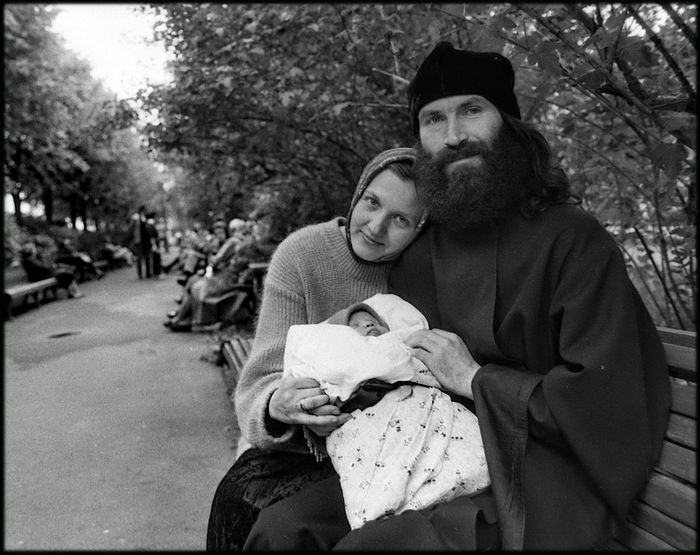We will continue our conversation about family life. In reading your feedback on the first part of my article,[1] I encountered an interesting thought: Priests’ families are so ideal in familial relations and the rearing of children that they cannot serve as an example, because they’re practically “foreigners” in a “familiar body.” It’s like in chess, when you have a stalemate—either you speak about family, raising the bar as high as possible, while many readers plunge into depression and overdue regret, saying, “My train has already left and it’s too late to change anything in my life now;” or you keep quiet, with a feeling of guilt before others for the well-ordered life you have, by the grace of God.
First, dear brothers and sisters, there’s no need to be enchanted by us parish priests and our families. That is usually followed by the opposite—deep disappointment. In our lives, including family life, there are not a few problems, about which it’s better for you not to know. We’re not angels and we’re not saints, but all the same, we are called by God to be good examples for you. It is completely normal and natural to see a priest with a good family. The saddest thing is when a pastor’s word clashes with his own life.
Second, no matter what, we must continue talking and talking and talking, and you must listen and let it sink in.
If a priest and his wife have a family life, then certain definite steps led to it, and important spiritual laws and commandments were fulfilled. Perhaps someone told them the right words, and they managed to obey. Their parents really prayed for them. Finally, they simply preserved tradition and fidelity to the age-old way of life of our ancestors—who managed to live properly. We will try to meditate upon this, to take the correct steps and make the necessary effort.
Thus, an important constituent of a happy family life is the desire for the spouses to be together—ideally, always and everywhere. For example, like my wife’s parents—they lived in marriage almost forty-five years, and even worked together, and then they also spent weekends and vacations together, and of course, dinner together, and better yet—breakfast together, or at least a morning cup of coffee together. The status of a family man is such that he should always be seen with his wife, and he should want that. The golden rule of family is: Go nowhere without your wife; and if you don’t want to go with your wife, then absolutely do not go there.
It is important to call home while at work: It is a sign of care and responsibility for your wife and family. Men! You must say something pleasant to your beloved on the phone during the day (no matter what)—women don’t need a lot—and there will necessarily be good results. But we husbands don’t do this, and then we’re surprised when the atmosphere in the family reminds you more and more of a polar winter. Today, the majority of the workforce, and especially men, have irregular working hours. The wife is home alone all day and, naturally, waits for her husband to come home. Therefore, having turned off your computer, you should hurry home, allowing yourself time along the way to stop for something delicious and sweet, for dinner to be more enjoyable. It is not good when husbands leave their families for a long time for the sake of work. You constantly hear stories of cheating far from home, and sometimes about divorce. In such cases, it would be better for the spouses to go to work together, and the children to stay with grandma or a nanny.
The relations of a husband and wife are unique. They are built through many years of painstaking labor, in time by the grace of God turned into a tender and warm union, the name of which is love; but they are often recklessly and irrevocably destroyed, if sin and the incorrect behavior of even one of the spouses penetrates into their nature. Spousal relations are always a struggle, and there are always dynamics present in their nature. They can never simply “conserve.” Today everything in the family is good, but what will be tomorrow, nobody knows. You have to always keep your finger on the pulse. The relations of spouses are different from that of children and parents, or brothers and sisters. I’ll give you an example. It’s a shame for me to speak about it, but I didn’t see my cousins for nearly twenty years. They don’t live in Australia, or even in Canada, but only… in Mytishchi [a suburb of Moscow]. But I went to see them, and when we met we hugged and kissed, and then we sat at the table, and we became again as in childhood: Natulka, Irinka, and Andrushka.[2] Our relationship thawed so quickly, like blini in a high-frequency microwave. The same thing happens when some wayward son, having been away who-knows-where for years, knocks on the door of his parents’ home… It would be completely different with spouses. Separation forms a habit, but sometimes there is a need for a husband and wife to live without one another. The words of the poet K. Simonov, from his famous poem “Wait for Me,” are fulfilled more and more rarely today. To forgive, to pity, and to endure one another is becoming more and more difficult for modern families. What is the reason? It is obviously because they did not hold their spousal relations dear and did not order them properly; and for some these kind, warm relations never even managed to begin—everything collapsed, the family home not being able to withstand the blows of fate.
Most of all, especially in the beginning of family life, I was afraid that some kind of coldness and formality would appear in my relationship with my matushka. I was terrified that we would do just fine apart, each doing his own thing. That’s why at first I would literally run home, desiring to be near her. It is good that she would wait for me, and she needed me. Even having lived together for nearly twenty years, I tried not to get held up anywhere without a worthy reason—I hurry home.
From the very first years of marriage, it is necessary to uphold the formative principle of family life—to desire only that which strengthens and improves your family life, that which creates a good and blessed atmosphere in it. You should reject any attraction or task that brings dissonance and inhibits your formative beginning. As an example—there’s a difficult situation with husbands’ and wives’ friends and acquaintances. Can a married person communicate closely and become good friends with a single person of the opposite sex? Or can a married woman have a divorced female friend? In my view—no. No one will benefit from such a friendship. The married person will be tempted towards freedom and single independence, and the bachelor will simply envy the other’s happiness. What’s the conclusion? You have to learn to be friends with family people. This is our nearest and dearest task. A married person must sacrifice that which before marriage was, in many ways, his life. This could be sports, hiking, fishing, and all possible friends and company.
You have to create and adorn your family life bit by bit, every day laying another small brick in the building. Both spouses should work on this. Women also must reject many things, so that their family lives would become happy. Here the close involvement of your beloved mother can often be a serious hindrance. For some reason, it’s very hard for modern young married women to get out from under the close control of their mothers. I know many examples of the collapse of a family precisely because of the wife’s mother. Really, these mothers-in-law were mainly divorced themselves, and had only one child, just like them—an unhappy daughter. The parents of children living in marriage must necessarily give the young family the freedom to solve their own issues that life places before them. And young spouses should not fear the responsibility of making decisions; and it’s certainly not necessary to call your mama and ask her advice about everything.
Probably every one of us was at least once a guest of a family that we didn’t want to leave. This is how a Christian family should be: that people wouldn’t want to leave us—with a special Christ-like, evangelical spirit. We know that the spirit creates a pattern for itself, and the family and home atmosphere forms and molds a person; but we ourselves create the atmosphere of our homes. Best of all, it is obvious in children. They grow up fully dependent on the family spirit and climate. Therefore, when people ask me what the most important thing is for children to receive from their parents, I’m ready with the answer: a happy childhood.
We could talk about family life for a very long time, and such talks are necessary. Family should enter our consciousness as the greatest value, which we must preserve and protect with all our might; and our children and grandchildren should constantly hear about it. We should begin serious conversations on adult life with our children from the earliest years.
Conventional wisdom is wasted by many in our time, including the art of married life. People often make irreparable and unacceptable mistakes in life, and it’s already too late to help them then. There remains only to put up with yourself, regret your life, broken by sin, and smile through the tears, seeing the good fortune and happiness of others. If we sometimes weep with those who weep, then maybe one in a thousand rejoices with those who are rejoicing, as the apostle Paul commands. Such is the bitter truth of our lives; but the Lord wants to fill our lives with light and joy and has done everything for it and continues to do so. God does not want people to weep and suffer in agony. We ourselves make our lives so joyless and gray. Let us together seek the path to improvement. This path exists, and millions have trod it. He who has developed a family life is truly happy.
The path to familial happiness lies through life’s struggles and working on ourselves for the good of those dearest to us. Every passing year in the family teaches us to thank God for everything, even for the sorrows and failures, for the labors born and the effort spent. I want to continue to live in my chosen direction, thinking more of my loved ones and their needs and less about myself and mine. And moreover, I want to help people, if not in deed, then at least in word, saturated with experience and compassion for man. After all, we are Christians, and this is what the Gospel teaches us.






